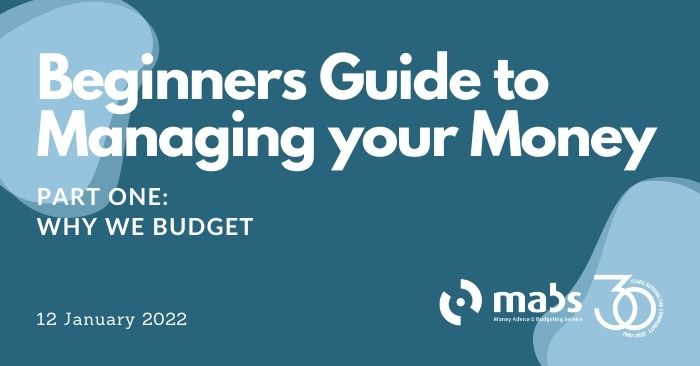Beginners Guide to Managing your Money
 Money management is simply another way to say budgeting. Many people don’t like the term ‘budgeting’ as it can seem quite loaded and challenging. It doesn’t have to be, and at a basic level, money management or budgeting is simply a record of the money you have coming in and the money you have going out.
Money management is simply another way to say budgeting. Many people don’t like the term ‘budgeting’ as it can seem quite loaded and challenging. It doesn’t have to be, and at a basic level, money management or budgeting is simply a record of the money you have coming in and the money you have going out.
In this series of blogs, we will simplify the process of budgeting/money management (referred to as budgeting for the rest of the blog series) and outline the positives of keeping track of your finances.
We’ve asked our expert advisers in MABS, who work with clients on their money management skills every day, to break down the ins and outs of budgeting. We will share these tips and skills over the coming weeks.
Start at the beginning
Everyone approaches budgeting a little differently, and this can add to the confusion when you don’t know where to start. We’re going back to the very start and will work through each stage, so you can understand what, why, when, who, where and how budgeting can impact your daily life.
What is a budget?
Simply put, a budget is a plan that sets out your income (the money you have coming in) and expenses (the money you have going out), so you can take better control of your finances.
Some people budget weekly, monthly, quarterly, or even yearly, depending on their needs. In our next blog, we will focus on a budget based on your pay packet to keep things simple, and we can build from there.
Why should I budget?
There are many reasons to budget:
- Make the most of your money
- Identify where your money is going
- To be able to save regularly
- Paying your bills or debts on time
- Take control of your finances
- Planning for a major purchase or a life event
If you don’t identify with any of these reasons, then maybe the benefits will show why budgeting is a good thing:
- Gives you control over your money
- Ensures you don’t spend money you don’t have
- Allows you to have a safety net by creating space for an emergency fund
- Can help you work towards financial goals
- Peace of mind
When a client first comes to MABS, our adviser will it down and make a budget with them to identify where there is room for improvement and where the client is struggling. It is also used to identify opportunities to maximise income and ensure that you have applied for all available supports.
Next Steps
In our next blog, part 2 of our budgeting series, we focus on How to Get Started with your budget based on your pay packet. If you’d like to do some additional reading or learn more about budgeting, then visit How to Budget.
That’s all for now but check back soon for our step-by-step guide to start your budget.
Call the MABS National Helpline on 0818 07 2000 Monday to Friday, from 9am to 8pm, WhatsApp 086 035 3141 or request a callback if you want to talk confidentially about budgeting, problem debt or general financial matters.




Facebook
twitter
Instagram